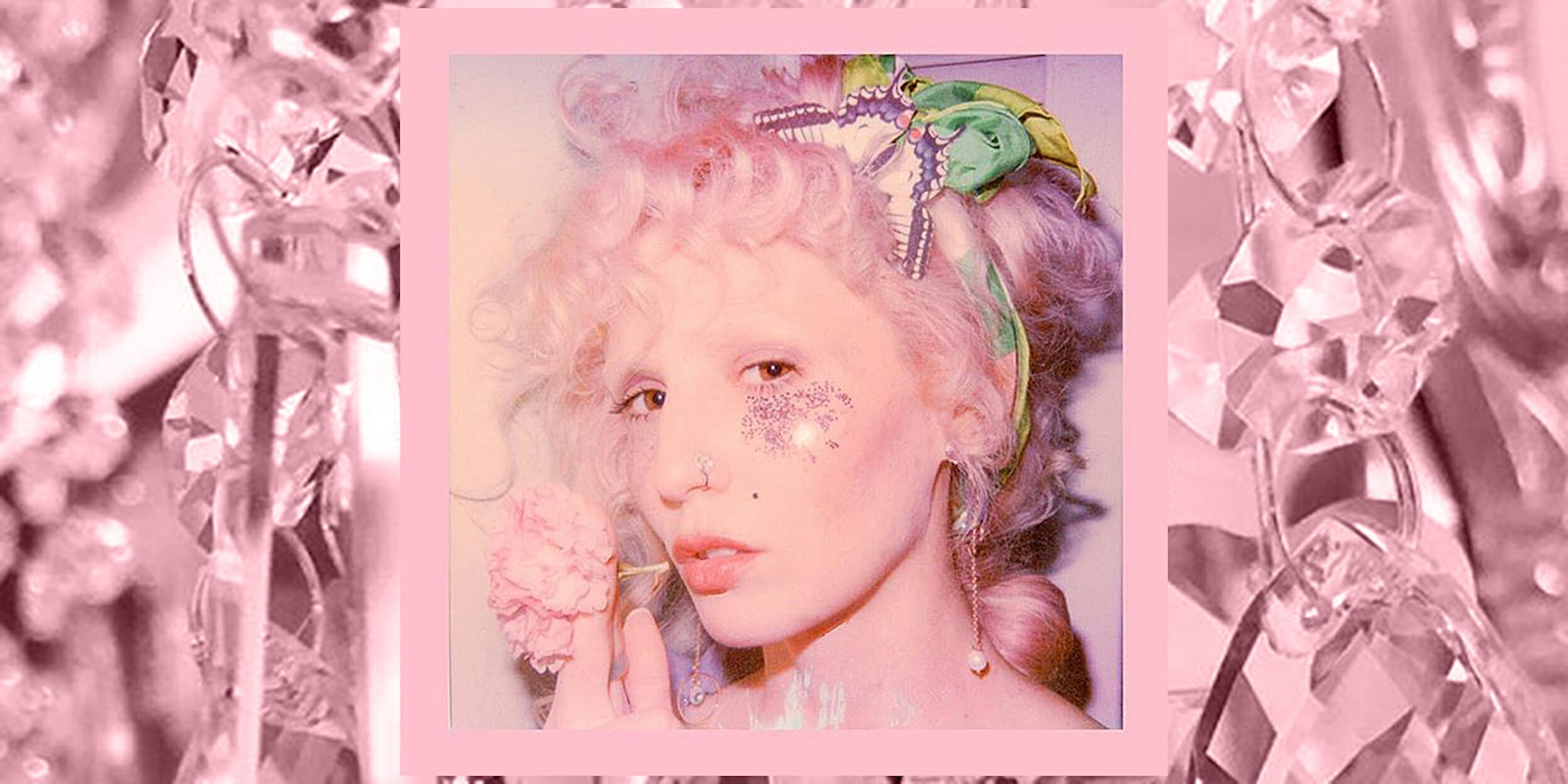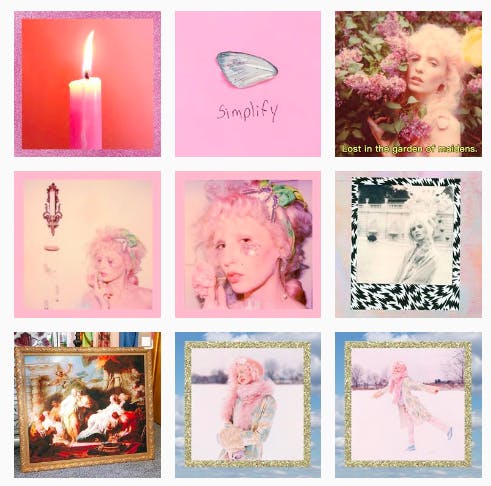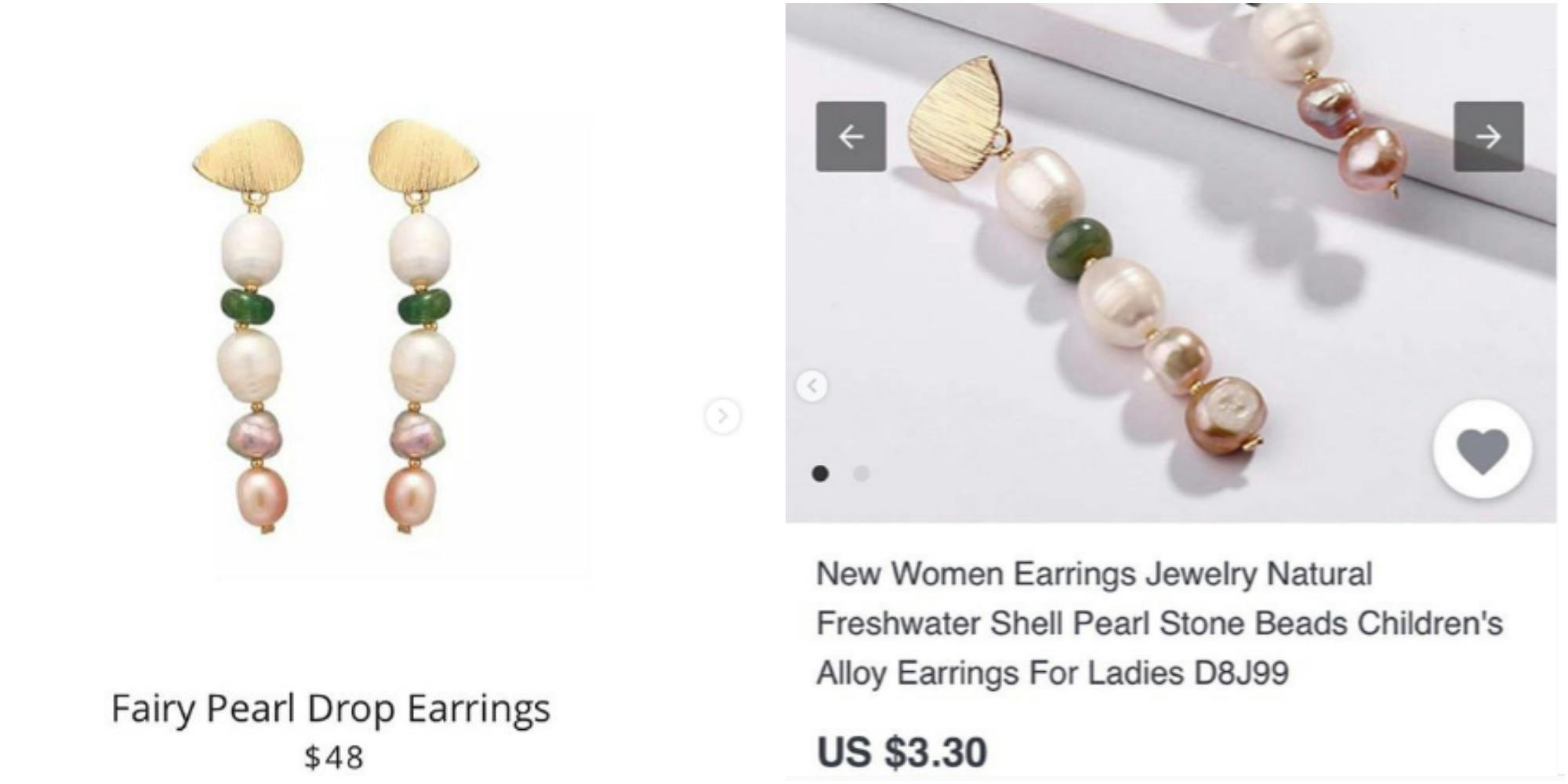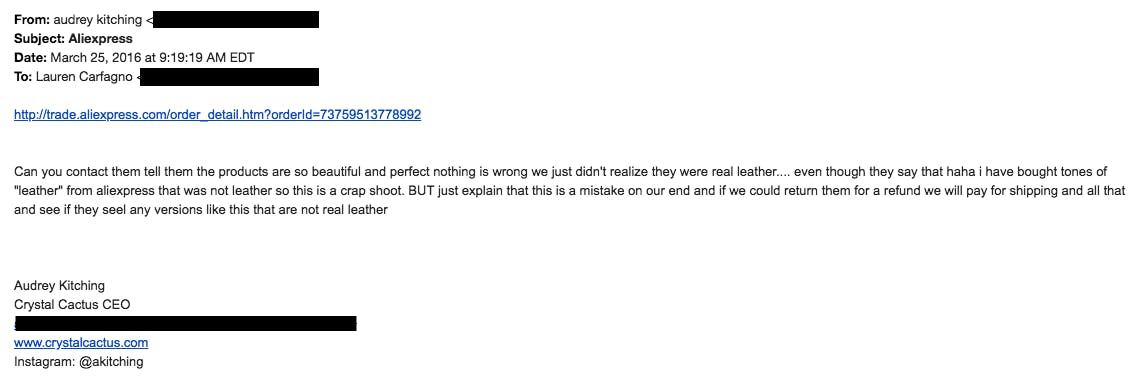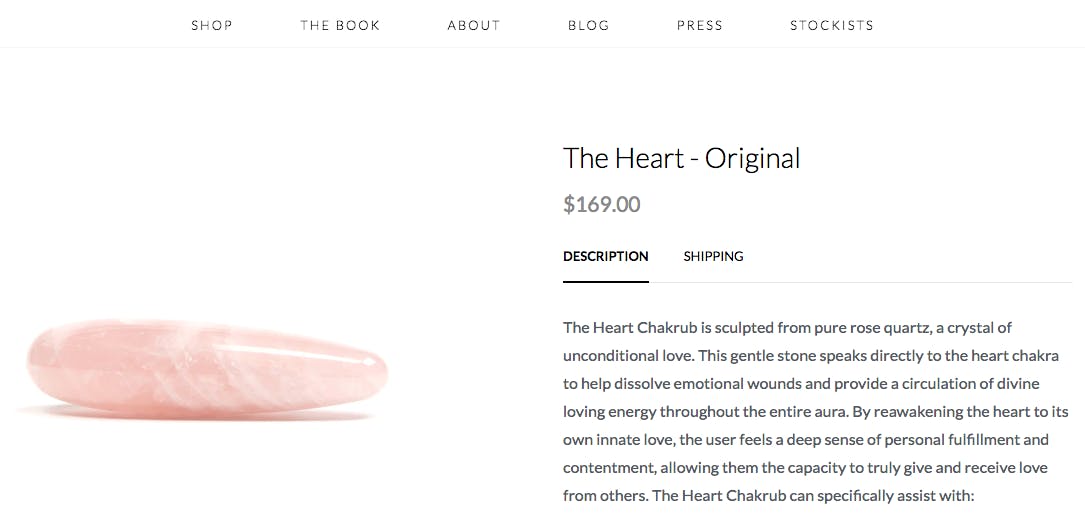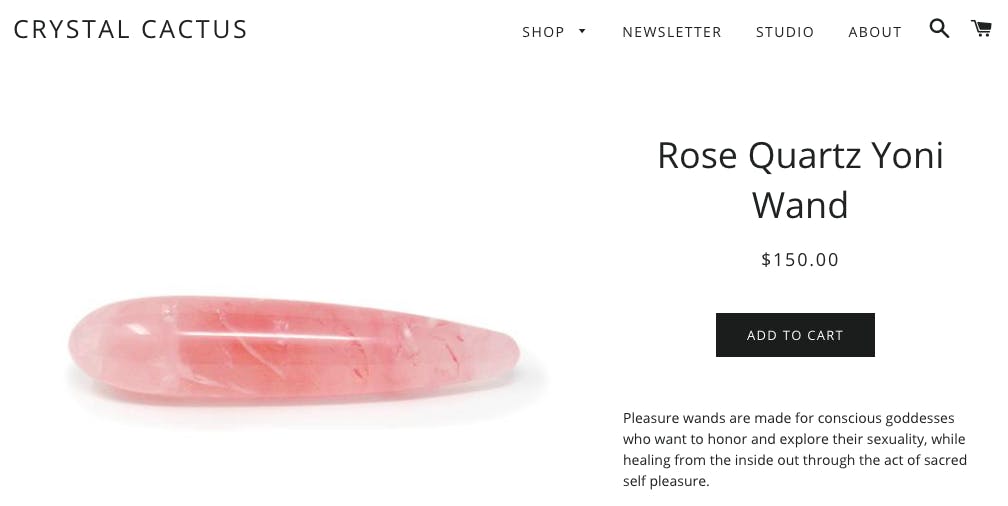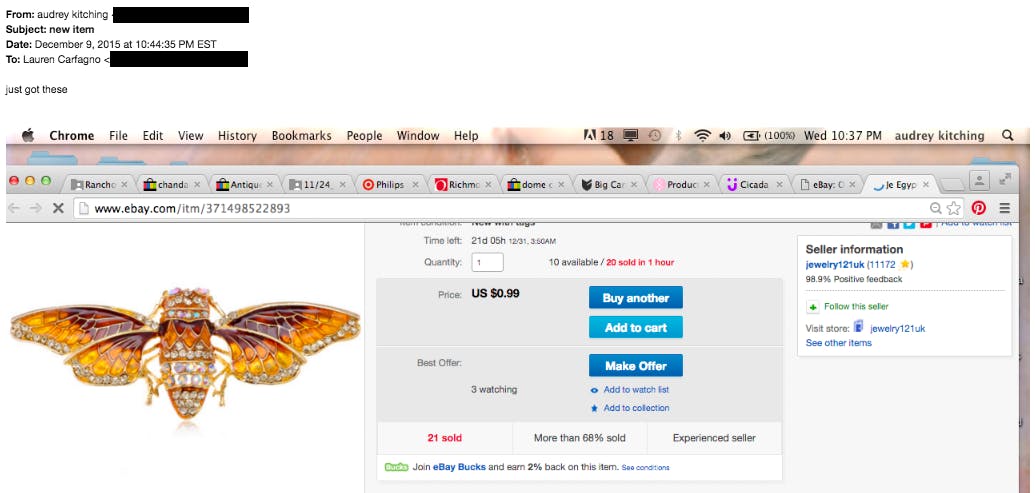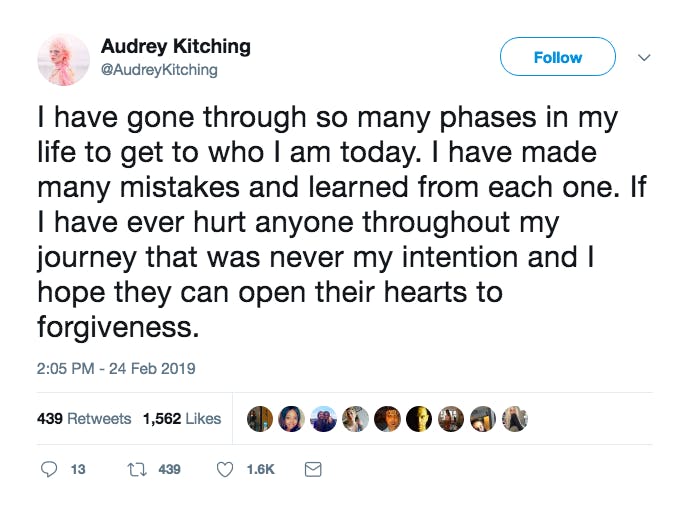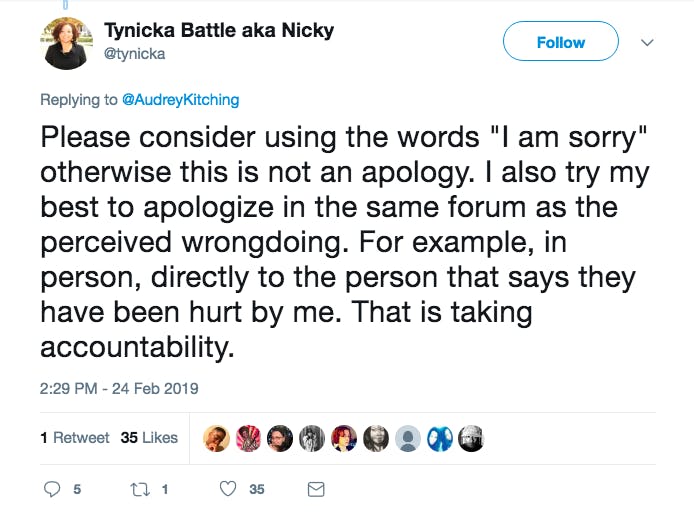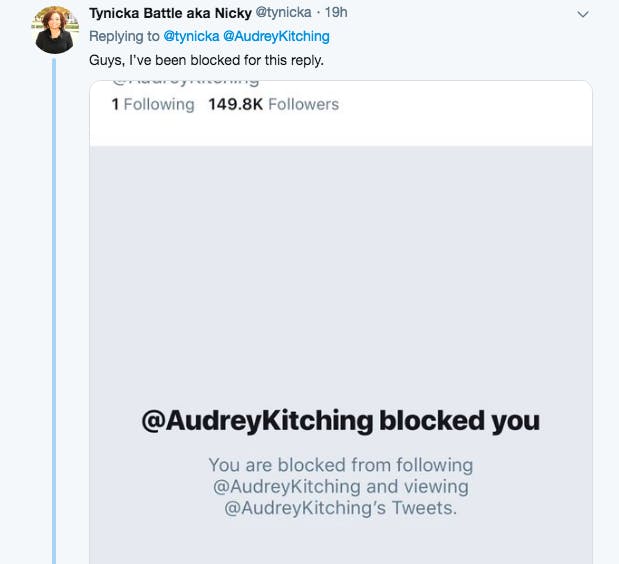Warning: Contains frank descriptions of abuse and suicide.
Stumble upon Audrey Kitching’s Instagram account, and it’s easy to get sucked in. Scrolling through her feed feels like wandering an alien’s garden. The lighting is soft and pastel, the air foggy, the extraterrestrial star herself a cross between Rainbow Brite and Marie Antoinette. Pink curls frame her pale face. A starburst of glitter often highlights a single cheekbone. Whether she is caressing a flowering branch or wearing red rose petals as blush, her stare is as blank as it is serene. Her captions are dream-like, winding, meme-ably prophetic. “Stop feeding anything that’s stealing your peace,” reads one. “Today is a massive ending,” she says in another. “You can feel it in the air.”
According to Kitching—who identifies as an artist, a crystal healer, and an “energy alchemist”—we are always transforming. Paths that do not align with our “soul purpose” are about to fall away. Oh, and we’re all transitioning from 3D to 5D—no need to stop at 4!—an elevated dimensional state where what we want will manifest more rapidly than ever. The effect alternates between amusing and alluring. Even if you’re among those who would laugh at Kitching’s broadcasts, you’re likely to keep scrolling through her magical promise.
In fact, Kitching has amassed over 259,000 followers on Instagram. On Twitter, she has upwards of 155,000. Kitching exists as a hologram online—no speaking engagements, or public appearances—and yet her name appears in wellness publications like Shape and Self, where she has become a trusted source for her knowledge of healing crystals. Well+Good called her a “wellness ‘it girl,’” and her mentions are filled with devoted followers who enthusiastically share their gratitude for her posts. To her fans, Kitching’s messages are a balm. She tells them just what they need to hear (“When you trust your journey you know that you are always safe and protected”), exactly when they need to hear it (“your captions always come when I need them so badly”).
Her fandom isn’t so different from that of your average influencer, and you could say Kitching has tapped into an audience that isn’t short in supply: the young, the hurting, those dabbling in spirituality. But unlike other “new age” social media stars—like astrology favorite Chani Nicholas, who produces socially conscious analyses as well as Spotify playlists for each sign, or the massively popular Hoodwitch, who identifies as a modern witch and whose store is accompanied by “witchtips” blogs—Kitching, her beliefs, and her services as a healer are loosely defined. Even in the unregulated healing industry where creative titles are the norm and it’s common to have an arsenal of practices that are diverse and malleable, Kitching’s work as a healer is blurry at best.
Dig around and you’ll find an internet footprint that is incongruous. Kitching first attained social media celebrity status as a mid-2000s Myspace queen. She still had pink hair, but it was hot pink, straight, and wild like that of the scene rockers she worshipped. She once starred in a YouTube reality series called Trashy Life—a Suicide Girls girls version of Paris Hilton and Nicole Richie’s The Simple Life—with Zui Suicide. She was briefly a fashion blogger for Buzznet and has posed on more than one occasion for Nylon. She even starred in a Smashing Pumpkins music video. In short, Kitching’s past points to someone more hungry for fame than enlightenment.
https://www.youtube.com/watch?v=MKX_5CrYAGo
Specifically, Kitching has a history of reaching for, and amassing, the kind of fame that one gains not for any particular talent other than one for being noticed. How that path led her to where she’s landed today—doling out spiritual guidance via Instagram, Tumblr, and Twitter—is unclear. (Kitching declined the Daily Dot’s request for an interview.)
But what is clear is that her role in her business isn’t what she promises it to be, and that among the hundreds of thousands of followers her work has racked up, there are at least three women who now cite their relationships with Kitching as abusive, manipulative, and controlling.
…
The path to enlightenment, in the modern age of wellness, is crooked and ill-defined. It’s normal for a tarot reader or a reiki healer to have an online platform to reach their followers. However, it’s just as easy for someone who has a history of using her image to garner attention to wear spirituality as a costume. Kitching’s journey to healing may have been one of transformation, but it’s just as likely it was guided by the old standby “fake it till you make it.”
So how does Kitching, or any healer-influencer-prophet like her, make a living? Her one clear enterprise is an online store called Crystal Cactus, which she describes as a “soul project.” On offer are candles, oils, crystals, and jewelry priced at a significant markup from what you’d find in a local new age store, like a $28 amethyst point, a $36 soulmate butterfly brooch, and an $18 jar of glitter, sugar, and dried flowers labeled Manifestation Fairy Dust. Kitching is described as the “designer” for all these goods. According to the site, “Each item is lovingly made with intention in small batches while embodying the energy to transform, inspire, and heal.”
The brand seemed poised to take off in 2015, when Urban Outfitters placed holiday orders with Crystal Cactus for several of its oils, sprays, and jars of glitter, to be sold in both the U.S. and the U.K. Even then, Kitching bragged to spiritual fashion site the Numinous, “I make every sample myself and show my team everything, and we tweak it and collaborate on the final product.”
But on Jan. 19, a new Instagram account under the username fraudreykitching called Kitching’s soul project into question. Several members of the Instagram healing community—mediums, reiki workers, astrologers, and other practitioners—tagged the account in their stories, advising their followers to check it out for the truth about Audrey Kitching. The language of the account was pointed. “Let’s Keep It Real,” the avatar declared. Posts were littered with indignant hashtags like “#shameonyou” and “#guilty #asfuck.” But while the tone was scathing, the factual content within the posts was undeniably illuminating.
Screenshots of Kitching’s “hand-crafted” goods appeared in slideshows alongside screenshots of identical items available on Aliexpress, a Chinese retail wholesaler, for a small fraction of Crystal Cactus’ prices. A pair of “Fairy Pearl Drop Earrings” listed on Crystal Cactus for $48 was found for just $3.30 on Aliexpress. “Divine Garnet Earrings” priced at $64 were also available on Aliexpress for as low as $9.49. That Soulmate Butterfly Brooch you had your eye on? Also, Aliexpress.
In fact, emails shared with the Daily Dot also show Kitching placing orders with Aliexpress for jewelry to be sold on Crystal Cactus.
This wasn’t the first time someone had attempted to unmask Kitching for questionable practices. A Twitter account by the name of @Humasound has been tweeting about Kitching since as early as November.
In addition to sharing images of Crystal Cactus products that can be found at a far cheaper price on Aliexpress, @Humasound suggests that Kitching’s seemingly enlightening tweets have been plagiarized, including from such well-known sources as Jonathan Franzen, poet Anne Carson, and speaker Brené Brown, as well as from a guy who is often mistaken for Buddha.
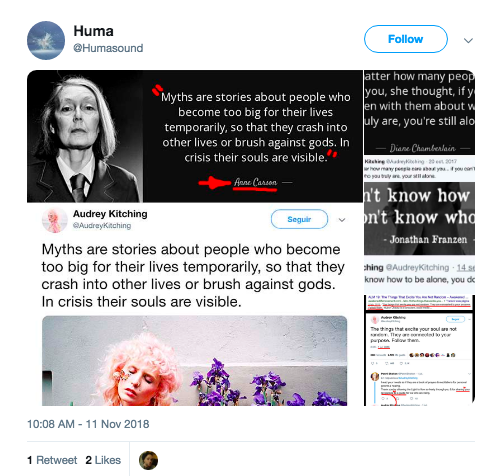
Some of Kitching’s followers have questioned her on the matter. But upon doing so, they say, they were immediately blocked.
While Urban Outfitters no longer carries the Crystal Cactus brand, Kitching frequently tweets with enthusiasm that she is working on something “new.” In November, she announced her latest project: the “Pleasure Garden,” which promises “healing and rebalancing through sacred sexuality.”
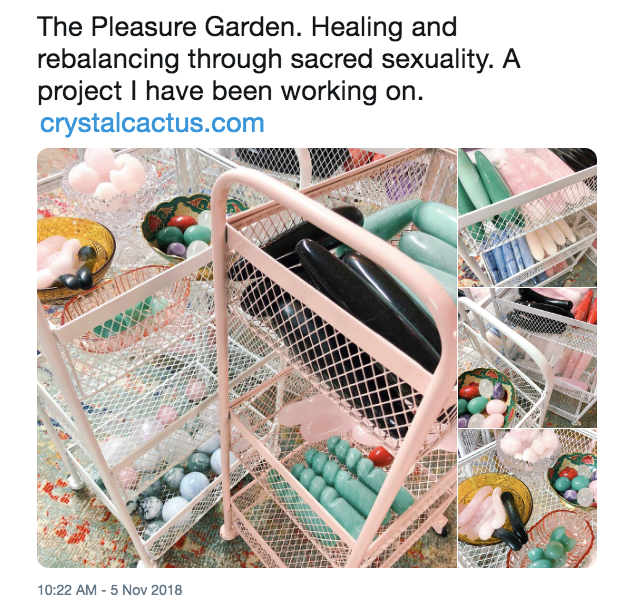
Many fans were excited by the merchandise, an assortment of erotic crystal wands, yoni eggs, and massage tools. Her mentions were filled with the typical stream of praise and heart-eyes emoji. But a handful noticed that many of the designs pictured closely resembled those of Chakrubs, a pioneer in the burgeoning crystal sex toy industry.
Vanessa Cuccia, the founder of Chakrubs, was shocked. Kitching’s Crystal Cactus store had stocked Chakrubs products for years, and Cuccia said Kitching had placed her most recent order in August, with no notice that she intended to terminate their relationship. As soon as Cuccia saw Kitching’s tweet announcing the “Pleasure Garden,” she recognized the simple, tapered design of many of the “yoni wands” pictured as her own—one she had sketched in 2011 when she first had the idea for her company.
While there are plenty of copycat crystal sex toy companies emerging today (Kitching could just as easily have gotten her designs from Aliexpress), Cuccia asserts that several of the items available on Crystal Cactus are signature Chakrubs designs: The Rose Quartz Yoni Wand that Kitching sells for $150, she said, is nearly identical to Chakrubs’ $169 Heart-Original, so is Kitching’s Divine to Chakrubs’ Heart-Curve. Furthermore, while the sizeable Chakrubs price tag comes with the assurance that its crystals are ethically and sustainably sourced and that its products undergo rigorous quality control inspections, Kitching’s goods carry a similar price tag with no such promise.
Despite all this, Cuccia spoke fondly of Kitching when she recalled their personal history. She told the Daily Dot, “I was a fan of her Twitter. I would be like, ‘Oh my God, how is she so knowledgeable about all of this energy stuff?’” In addition to having a business relationship, the two were very friendly. “We had even talked about me going to Philadelphia for tea one day. She endorsed my book,” said Cuccia. But when Cuccia reached out to question Kitching’s decision to carry goods so similar to her own, she said her concerns were dismissed. “She kind of brushed it off and said, ‘I’m a healer first and foremost.’ I guess meaning ‘I’m not a businesswoman’ or something. I’m not sure what she meant.”
Cuccia said that the experience overwhelmed her (“It was very upsetting. I was legit crying”), but she remains reluctant to condemn Kitching’s behavior. “I have very mixed feelings about this because…I’m not about drama or anything like that,” said Cuccia, who started Chakrubs after healing her own sexual trauma with crystals. “The whole environment of call-out culture and ripping people down is so far from what I’m about.”
Kitching’s former relationship with Cuccia, and her history as an outspoken Chakrubs customer, make the choice to stock such similar items feel decidedly icky. If all the allegations against Kitching are true, what she’s done is deeply insidious. Harnessing healing culture to turn a profit is one thing, but selling mass-produced goods most likely made in unethical conditions under the guise that they are hand-crafted and contain sacred healing qualities is another. At its best, wellness culture aims to reduce harm and deliver nurturance to those who are hurting. But to seek out the most vulnerable with the understanding that they will be the easiest to bleed—whether it’s for money, a rising follower count, or an online trail of personal praise—perverts this dynamic.
Aki Hirata-Baker, a co-founder of Minka, a healing collective in Brooklyn, New York, that focuses on ethical practices, told the Daily Dot that nowadays social media makes it easier than ever to share a healing message with large groups of people. But, she said: “It’s also this hub of fakery … because with the wording and the beautiful imagery you can use, you can make yourself sound like something you are not. And some people thrive on that, because they are really good at it.”
…
“She’s nothing like what she portrays herself on the internet to be,” Kitching’s former assistant, Lauren Carfagno, told the Daily Dot.
Carfagno is one of the few people to work closely with the healer incarnation of Kitching and her operations at Crystal Cactus—and if Cuccia felt betrayed, then Carfagno felt victimized. What she thought would be an entrée into her dream career turned out to be a nightmarish year of isolation.
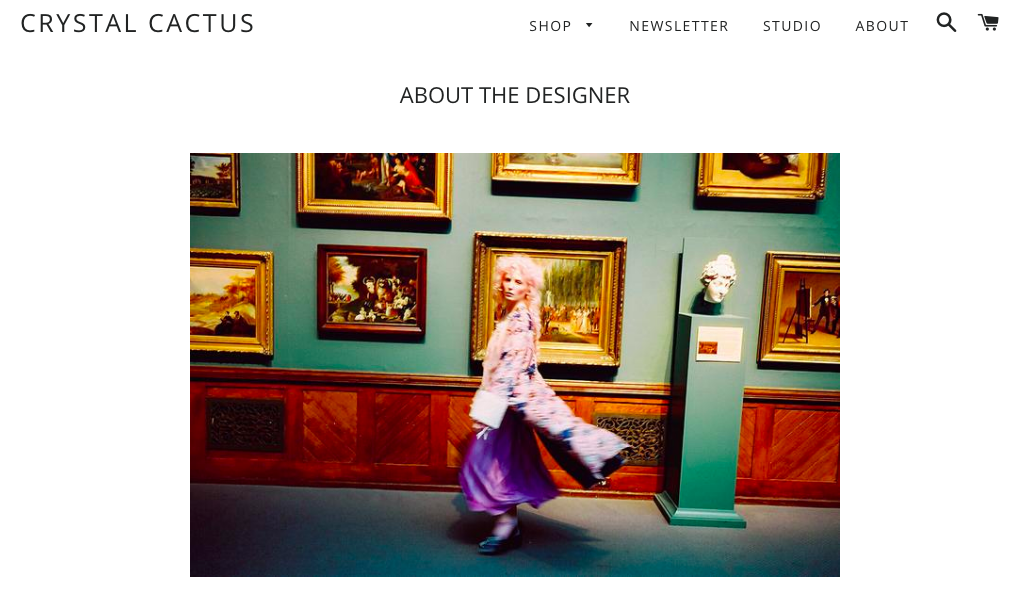
Carfagno had admired Kitching from a distance for quite some time, so when Kitching put out a call for an assistant on social media in 2015, she jumped at the opportunity. “I was like, ‘Oh my god! This would be my dream job!’ Working for a beautiful metaphysical company—it’s edgy. It’s not like hippy-dippy. Everything is done with class,” Carfagno said.
However, when she was told to report to an address in southern New Jersey on her first day, she was perplexed. Carfagno had expected she’d be working out of a studio based in Philly, since many of the products sold by Crystal Cactus at the time were labeled “handmade in Philadelphia.” Instead, she said, the Crystal Cactus studio was based out of the renovated basement of a suburban home Kitching had inherited from her grandmother.
Carfagno quickly brushed her concerns aside and immediately set to work with one other employee, LaBreah Welliver. Carfagno said that this was essentially the entire Crystal Cactus team. Sometimes, a friend of Kitching’s mother would show up after her day job and help package orders.
As for the energy alchemist herself, both employees said Kitching was largely absent from the workspace. “She spent 85 percent of her time in her bed or in her bathtub, and she would text you or call you if she needed to tell you something,” said Carfagno.
Welliver, who worked for Kitching from around 2012 to 2015, said it didn’t take long for her duties to extend to personal tasks, such as scooping cat litter for Kitching. But Welliver said she wasn’t put off by it at first because their relationship was promising: “She would tell me that if I put the work into Crystal Cactus, I would be running this business with her one day and it would be this empire.”
While Kitching did not do the hands-on work she claimed on the Crystal Cactus website and in interviews, Carfagno said Kitching did, on occasion, take a pair of pliers and attach a cheap crystal pendant, which came from a bulk shipment, to one of many chains she’d purchased on Aliexpress. (Carfagno has also shared emails with the Daily Dot that show Kitching purchased items from eBay, too.) “She’d say, ‘There. You see that? Make 40 of those,’” said Carfagno.
Welliver, whose job included writing product descriptions on Crystal Cactus, said she challenged Kitching on more than one occasion regarding the false marketing on her site. “Everything was cheap, bought in bulk from China, and I had a big problem with that,” said Welliver. “She’d want me to describe a necklace having a sterling silver chain. And then we’d get customer emails saying, ‘My chain is black and deteriorating.’ I’d show Audrey and she’d say, ‘What did they expect for a $35 necklace?’”
Welliver might have once been Kitching’s pet, but she was slowly being replaced by Carfagno. Carfagno said Kitching started asking her to leave work early to accompany her on errands, and would also buy her meals and offer to purchase her gifts. On one occasion, Carfagno admired a faux fur jacket at Forever 21, and Kitching later gave it to her as a present. “If I liked something, she’d say, ‘I’ll get it for you!’” said Carfagno. If Carfagno protested, she said Kitching insisted that it was fine. “‘We’ll just put it on the PayPal card.’ That was her favorite thing to say. She loved the PayPal card.” The PayPal account was where all Crystal Cactus purchases were deposited, according to Carfagno.
Carfagno also said Kitching invited her to stay late for dinners where she offered to teach her how to harness her own energetic gifts. “[She told me,] ‘You’re so spiritually gifted. You’re an empath. You were guided to work for me so that I could be your mentor and teach you to tap into these gifts. And eventually, you need to move down here to be closer to me.’”
Eventually, Carfagno did.
Carfagno was 26 years old. She had recently gone through a breakup and felt misunderstood by her parents. Kitching encouraged her to cease contact with her family. “At the time, I didn’t have a super solid relationship with my parents. She kind of like wiggled her way in and…put things in my ear, saying my mom doesn’t understand the higher spiritual path that I’m on,” she said.
In September 2015, Carfagno moved from her parents’ home to be a 10-minute drive from Kitching. This was the beginning of what Carfagno now describes as the darkest period of her life.
Carfagno and Welliver said they worked tirelessly to fulfill several big orders from Urban Outfitters. But after Welliver confronted Kitching about the personal tasks that pulled her away from her job, she said she was fired. Kitching also allegedly fired another woman who had been handling publicity. Carfagno said she became her sole studio employee—handling emails, stocking, shipping, packaging, and PR, and coordinating photo shoots with makeup artists and photographers. But none of the extra work amounted to a raise. “I was making $12 an hour,” Carfagno said.
Carfagno added that she was frequently paid late, and often only $100 of what she was owed at a time. Kitching allegedly said there simply wasn’t enough money in the PayPal account to pay her in full. But within days, Carfagno said she’d witness Kitching using money from the PayPal account to purchase clothing for photo shoots or “golden swan faucets for her bathtub.”

Between the pressure to stay for dinner and the sessions to attune Carfagno to her healing gifts, Kitching made increasingly extreme demands, according to Carfagno. Kitching needed her to come over and help her fight demons in her home. She had also allegedly developed an obsession with a high-profile musician she’d met in L.A., Garrett Borns, who has since been accused of sexual misconduct by multiple women, allegations which he denies. Carfagno said Kitching made her come over for empath sessions as late as 2am. According to Carfagno, Kitching believed she and Borns were twin flames, and that Borns needed to heal himself before they could unite “like a king and queen to bring this universe together.”
“She really abused me spiritually, emotionally, and mentally,” said Carfagno.
Despite long hours and poor pay, Carfagno said she never challenged Kitching—until a 2016 photoshoot where Kitching allegedly threw clothes at her. In the car ride back, she said she told Kitching that she didn’t appreciate how she was treated. She said Kitching replied: “I know what this is. In a past life, I was a queen and you were my servant… So, you’re reliving this lesson to karmically heal this wound within yourself. It’s your own ego. It’s not with me.”
By this point, a year into working with Kitching, Carfagno had become seriously depressed. She felt so trapped that she even had thoughts of suicide. “I thought maybe I should just put my head in the oven and end it right now. I felt like the only way out was to take myself off of this planet,” she said.
Carfagno finally reached out to her mom and promised she would leave. About a month later, in late April 2016, she said she wrote Kitching an email and did not return.
…
A private group chat exists called “I Survived Audrey.” Carfagno is a member, as is Alex March, a professional medium who befriended Kitching in 2012.
March said she had reached out to Kitching via social media about a deceased relative who was trying to connect with her. The two became close and, at first, Kitching wanted to learn reiki and encouraged March to take her talents public. “She gave me confidence,” March said of Kitching.
Kitching would allegedly bring March along to photo shoots and fashion week parties, where March would render her services as a healer and a medium to others free of charge. In exchange, March said, Kitching would receive free services and praise.
But it didn’t take long for the friendship to spiral from intimate to controlling, said March.
Kitching would allegedly be furious if March spent time with other people, even a boyfriend. March also described Kitching flying into frequent rages. The worst allegedly occurred when March got a taste of fame. March, a Jersey native, had appeared on an episode of Snooki and J-Woww to give the stars medium readings where she connected them with their deceased loved ones. March said MTV had been impressed with her performance on the show and invited her in for a meeting, but when Kitching found out, she was furious and demanded that March get her a meeting, too. According to March, the meeting went poorly. When Kitching was allegedly asked questions she couldn’t answer, she grew frustrated, put on a pair of sunglasses, and refused to speak. After the meeting, March said Kitching had an assistant draw up a reality show pitch for the two of them, but it never amounted to anything.
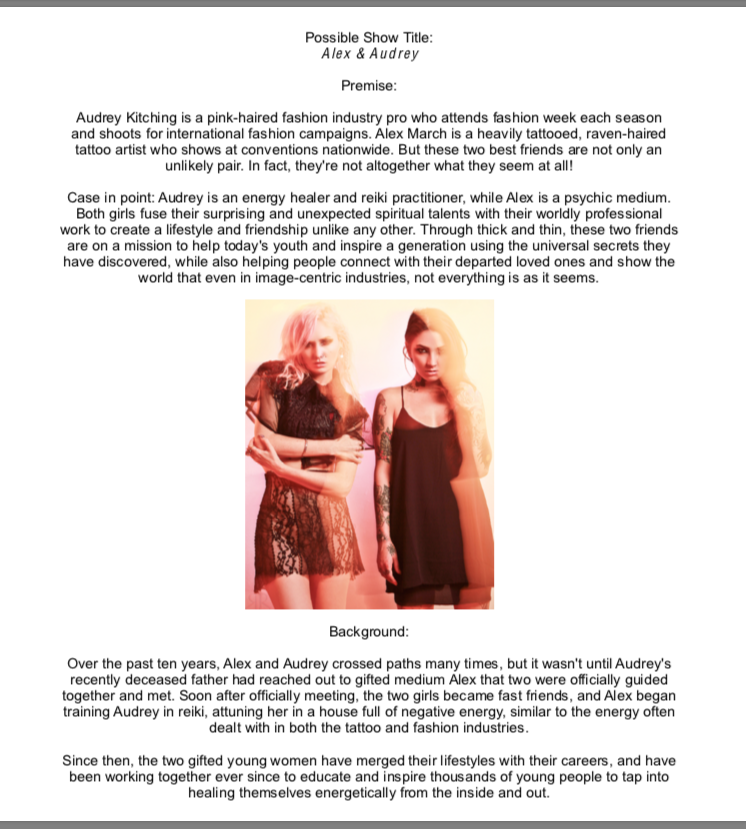
March’s relationship with Kitching sounds very similar to Mila Starfyre’s. Before Kitching set up shop in the renovated basement of her grandmother’s home around 2012, she lived in Los Angeles. She was seeking work in the fashion industry and as a model, but mostly she was successful at amassing a Myspace following. Kitching had gained visibility by dating Panic at the Disco’s Brendon Urie, and her Trashy Life reality webseries with Zui Suicide had earned her a following. With her hot pink hair and her post-punk glitter and grunge looks, Kitching stood out. Whether you thought she was fashion-forward or a fashion disaster, her look demanded attention.
When Starfyre, an energy healer and dancer, signed up for a Myspace in 2006, she came across Kitching’s profile. “I felt like I needed to help her. I needed to let her know there was sickness around her.” Like March, Starfyre reached out to Kitching first with some kind of intuition. Then, in 2009, they met in person at the Hello Kitty 35th Anniversary Party in L.A.
“I gave her her first crystal,” said Starfyre. “I still have the picture of us at the party, and she’s holding the crystal I gave her.”
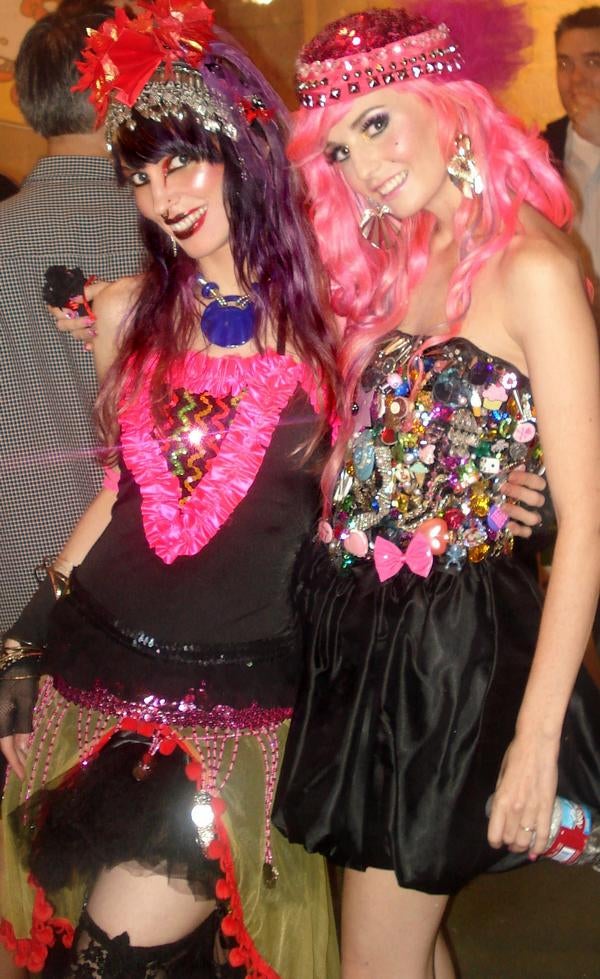
Later that night, Starfyre said she received an onslaught of text messages. Kitching wanted to know when they were going to hang out again and if she could come over that night, Starfyre said. As their friendship progressed, Starfyre said Kitching’s calls became more panicked. “She would say if I didn’t come over, she was going to kill herself. I felt bad because I know what it’s like to be in that place where you feel you have no one.”
Also like March, Starfyre alleges that Kitching was eager to experience her energy healing services. But, according to Starfyre, Kitching never paid her. “It started off with me helping her,” Starfyre said. “And then she wormed her way in and I became like a slave to her, available to her at any time.”
But above all else, both March and Starfyre claim Kitching stole pieces of their identities to masquerade as a healer. March went as far as to say that Kitching has ripped off her life story. In her 2015 Numinous interview, Kitching described her childhood confusion: “Growing up, I always thought I was losing my mind and dying. In reality, as a born healer I have always been able to empath other people’s physical alignments as well as their mental vibrations.”
“This is me. She is no empath,” said March, who claims that in their private conversations, Kitching openly mocked those who claimed to be empaths. “She did not want to help anyone. She wanted money.”
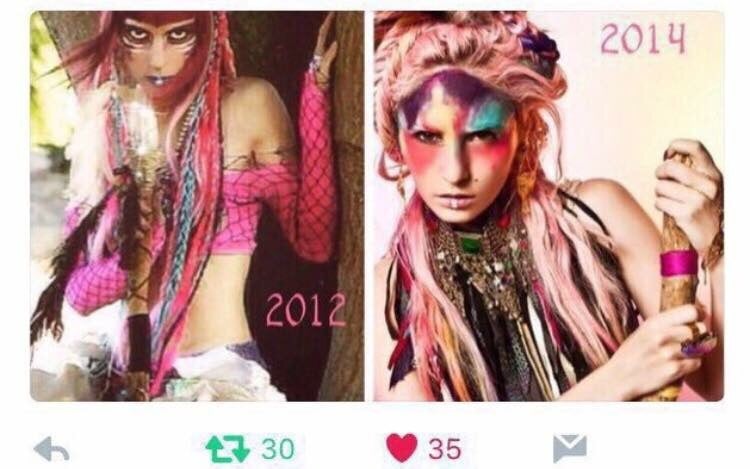
Starfyre felt Kitching was mimicking her style and her teachings without giving due credit. In the past year, Starfyre has posted multiple pictures of herself alongside photos of Kitching. To Starfyre, the similarities are startling. But to an onlooker, it’s hard to say that anyone owns these styles. In one pair of images, the women both wear tribal makeup, pink hair, and sport intricate, purposefully messy braids. In another, they kneel before a rainbow-colored auric background while wearing lace prayer veils. Can one woman really claim to own appropriation of a piecemeal energy culture over another?
…
There seems to be a pattern here among those who feel scorned by “Fraudrey”: According to their accounts, Kitching built them up, then tore them down, often when they could no longer help her accomplish her means to a famous end.
“Everyone that comes across Audrey’s path, she gets what she wants from them and then disposes of them,” said Welliver.
The promise of feeling better, or understood, is what has in part helped healing culture see a boom in recent years. From Goop’s jade yoni eggs to Moonjuice’s activated potions, selling holistic wellness—especially if it’s infused with a bit of magic—is bigger business than ever. There are also free, less-intimidating versions of wellness practices for everyday folks: See Trashbag Astrology’s zodiac memes, or online tarot communities on Facebook, not to mention Instagram affirmations like Kitching’s that lead to purchases made. While it’s easy to dismiss these trends as wholly aesthetic—driven by luxury items and a desire to feel good—the growing hunger for modes of healing outside of traditional Western medicine and psychotherapy point to a bigger shift in our culture. Practices like tarot, astrology, energy healing, or even crystal-infused face creams, encourage users to go within, to listen to our bodies and minds, to trust ourselves more completely.
And yet, the understanding that people are actively seeking healing and connection makes it easier than ever to prey on these vulnerabilities.
Ethically minded healer Hirata-Baker said that students of wellness should remain skeptical. She tells her own to examine not only their practices, but the sources of their information and even their tools. This includes thinking critically about their healing practitioner. “I would say to look into their past lives,” she suggested. “Where did they come from and what did they recover from that?”
Kitching’s past lives point to what has possibly allowed her to get away with these actions for so long: her enduring ability to exist in a liminal space between fame and obscurity. For all her reaching, Kitching has never actually made it big. If you’ve never heard of her and you encounter her, her follower count looks impressive. But if you look up some of her former Myspace scene queen peers, they have similar follower counts for doing little more than their own stylized photo shoots. In interviews, she is always labeled as an “it girl” on the cusp of something greater. And yet, she argues, fame isn’t of interest to her. But without the following she’s managed to maintain over the years, what exactly would Kitching have? Even the money she’s made from Crystal Cactus is owed to her followers.
These days, Kitching tweets regularly about the importance of letting go. We must, she argues, cease contact with narcissists, and anyone else who attacks us. If someone upsets you on social media, block them.
It’s impossible to discount the legitimate work Kitching has co-opted and the abuse she has allegedly imparted. And yet, for all her fakery, who’s to say she hasn’t—in the process of hawking marked-up crystals and jewelry—delivered many small moments of healing? Kitching’s spiritual guidance could be likened to a digital placebo effect. She may have given her followers the healing they needed, not because of her potency, but because of her followers’ own urgent wishes to be healed.
Despite her social media talents, Kitching has a feeling that soon people are going to want to get off various platforms. “A lot of people will feel the urge to have stricter boundaries with the amount of energy/time spent online,” she said.
She has yet to prophesize whether she’ll be one of them.
For more information about suicide prevention or to speak with someone confidentially, contact the National Suicide Prevention Lifeline (U.S.) or Samaritans (U.K.).
Update 3:34pm CT, Feb. 25: On Sunday, Kitching tweeted, “If I have ever hurt anyone throughout my journey, that was never my intention and I hope they can open their hearts to forgiveness.”
Some followers were critical of the statement and urged Kitching to offer a more direct apology. At least one follower reported that upon doing so she was blocked by Kitching.
Crystal Cactus’ “About the Designer” page has also been edited since the publishing of this article. It previously read, “Each item is lovingly made with intention in small batches” and now makes references to specific products being “hand made,” and does not include jewelry. “All of the Crystal Cactus candles and beauty products are lovingly hand made with intention in small batches while embodying the energy to transform, inspire and heal,” it reads.

